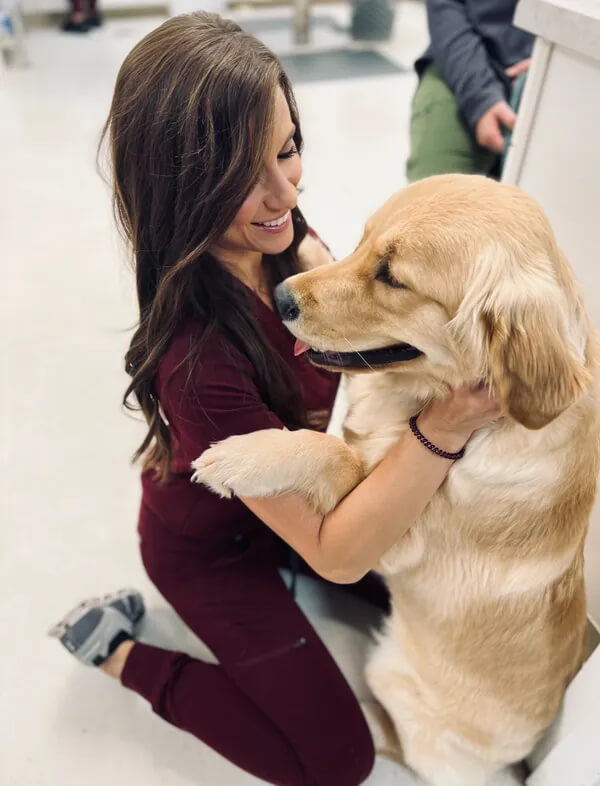 You aren’t going to want to read this story. Nobody wants to think of their pet dying. If your old pup is curled on the sofa next to you or your beloved cat is making biscuits on your shoulder, your first instinct might be to click away – that goes double if your child and pet are best buddies. With the wish that you don’t need this information for a very long while, there are some things to consider now, to ease the burden later.
You aren’t going to want to read this story. Nobody wants to think of their pet dying. If your old pup is curled on the sofa next to you or your beloved cat is making biscuits on your shoulder, your first instinct might be to click away – that goes double if your child and pet are best buddies. With the wish that you don’t need this information for a very long while, there are some things to consider now, to ease the burden later.
The grief of losing a pet is tremendous. For children, it is often their first encounter with the reality of death and it can shape their view of life and its end. Angie Childers, Grief Support Coordinator at Oasis Animal Hospital, has the difficult, honorable job of walking alongside families as they prepare to let go of their four-legged loved ones. Choosing the time to say goodbye is a decision to make in consultation with your veterinarian. And if your child needs extra support, be sure to reach out to their pediatrician for additional resources.
“It's not that I enjoy that process, but I actually enjoy being able to be the technician that's there for them and help them through that moment,” Childers said. “It's a very difficult moment. Most of the time, the clients are with their pet while they say goodbye. Sometimes it's too hard for them, and I make sure that myself or someone is there with (their pet). They're always loved up until that last second. I see it as an unfortunate necessity in this field, but I'm honored to get to be there and help them through that process in any way that I can.”
Childers said the greatest honor is when a family thanks her for being there.
The loss is hard – and that’s OK
Childers has experienced the loss of two pets of her own in the past two years. She said it is easy to imagine that there are things to do in advance that will make the loss less painful.
“What I have found, at least in my experience, is once you're at that moment, there's nothing that's going to prepare you for what you're going to feel,” she said. “There's nothing that's going to make it easier. There's nothing that's going to lighten that pain, make it less heavy. But what I like to think about is that maybe the answer in preparing for it is just acceptance – acceptance ahead of time that you know this is going to be hard, this is going to be painful, and it's going to stay with me for just a little bit – and be OK with that.”
Make memories
When one of her dogs was diagnosed with a degenerative condition, Childers said she knew it would be a slow but inevitable decline.
“While he was still able, I tried to do things with him,” she said.
When families know their pet’s life is coming to an end, whether through age or illness, Childers recommends making memories, spending time together and giving that pet the opportunity to enjoy their days.
“If there are things that your pet is still capable of doing, do them and enjoy that time that you have with them,” she said.
Helping children understand
 Whether children should be present when a pet dies is a delicate, individualized decision for families. Childers sometimes has to help parents consider the process. The child’s age can impact what they understand and how much they are able to grasp, but they should be told the truth in a developmentally appropriate way. She said parents should be open with children to the best of their ability to understand it.
Whether children should be present when a pet dies is a delicate, individualized decision for families. Childers sometimes has to help parents consider the process. The child’s age can impact what they understand and how much they are able to grasp, but they should be told the truth in a developmentally appropriate way. She said parents should be open with children to the best of their ability to understand it.
“As they get a little bit older, kids can have some pretty strong emotions about it, and I think that it's important that we know how to manage our own emotions, so that we can help them manage their emotions,” she said. “And when I say ‘manage emotions,’ a lot of people think that means hiding it or keeping it under control, and it's not. It's about understanding that if I need to cry, it's OK to cry. It's about understanding that while I'm standing in that room as a 10-year-old kid, and it just becomes too heavy, I'm allowed to step out. It's about teaching them that they have some choice. It’s OK to feel what they feel, and it's OK to step away from it if they need a minute. A lot of it just boils down to what you're feeling – whether you're a kid or an adult – is OK. Let me feel it. Let me experience it.”
Talk about it and then keep talking about it in the days ahead, if that’s what your child needs. Give older children a choice in dealing with those strong emotions.
“If there's something we don't ever want to do with the kids, regardless of their age, you don't want to avoid the topic, especially if they're bringing up and they want to talk about it,” Childers said. “Don't pretend like it's not happening. And we definitely don't lie to them about it. As a parent, we want to protect our child. We want to make sure they're not hurting. And it's a really hard concept, I think sometimes, to wrap our head around the fact that it's actually not our job to help them avoid pain. It's our job to help them learn how to work through pain, and this is a great opportunity to do that.”
The love and the loss are great
“Unfortunately, death is a part of life. We haven't figured out a way around that yet, even for our pets, and we never have enough time with our pets, that's one thing I find myself saying to pretty much every client I've helped through this,” Childers said. “Pain is a part of losing something we deeply love. As hard as it is, I accept and I embrace the pain, because it is a direct reflection of how blessed I got to be to love them.”
When and if you want another pet is up to you
Childers said the timing of getting another pet is a personal choice.
“Sometimes we need another one to help us through it, and that's OK,” she said. “There's nothing wrong with that. And sometimes we want to sit with our grief for a little while and just feel it before we're ready to love another one. That's OK, too. I think it's about letting go of what your friends, your society, coworkers, what anybody else tells you is supposed to be the right time, and just listen to what you're feeling. You’re going to know when it's the right time.”
-
Get pet care tips at oasisvets.com/news.
-
Get tips from the American Academy of Pediatrics for helping children from toddlers to teens grieve the loss of a pet at healthychildren.org.
